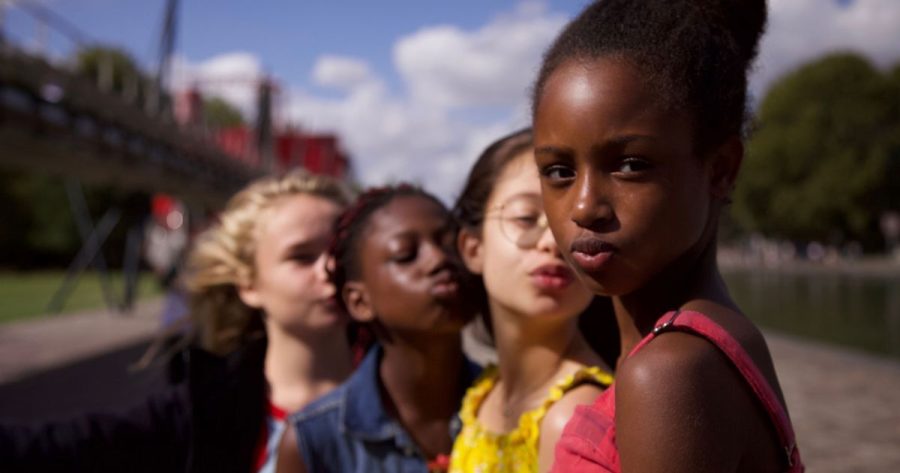Movie Review: Controversial Netflix Drama “Cuties”
Scene from “Cuties,” released internationally on Sept. 9
September 23, 2020
With much of the entertainment industry having been on pause amidst the COVID-19 pandemic, Netflix has continuously been delivering new content, including one of their most recent releases, “Cuties.” French-Senegalese director Maïmouna Doucouré emerged into the feature film category this Summer with “Cuties” as her debut film. Initially released in France, the film gathered praise from not only the French but also at the 2020 Sundance Film Festival.
The film is based on Doucouré’s own experiences as a young woman and tells the story of 11 year old Amy’s struggle with identity as a girl raised in a conservative Islamic household. Amy is violently aware of the position females hold in society, as she witnesses her own mother’s trauma during her father’s second marriage, which is something that was seemingly glossed over in the film.
Attempting to disconnect from the oppressive environment she finds at home, Amy becomes fixated on a group of girls at her new school called “The Cuties.” The Cuties are like any clique at school: exclusive and idolized. Amy strives to be accepted and become what The Cuties consider a true woman. Throughout this endeavor, she takes her younger brother’s clothing, steals her cousin’s iPhone, learns to twerk and even goes so far as to sneak her way into the position as the fourth member, only after another member of The Cuties is bullied out of the group. Detailing the path of The Cuties in their struggle to win a dance contest, viewers watch it all unfold through Amy’s lens as she simultaneously deals with the trauma of her father’s marriage and a newfound femininity.
Doucouré strives to highlight the frequent hypersexualization of young women but does so in a borderline distasteful manner. In fact, the only conclusion viewers see in the movie is a short 10 minute scene where Amy reconnects with her mother and changes into more age-appropriate clothing. The other 80 minutes consist of mentions of bulimia, a topic that is never further addressed besides a couple of seconds, children throwing around accusations to random men of being “child molesters” and a scene where Amy tries to seduce her own cousin. With no real conclusion to any of the aforementioned issues, the film leaves the viewer extremely unsettled with many unanswered questions.
While the movie is as traumatizing as it is unsettling with the images of pre-teen nudity, the issue falls in the balance that Doucouré failed to achieve. There’s a sense of glamourization that is put onto the idea of being a member of The Cuties that ceases to end until the last few moments of the film. The Cuties get and do whatever they please with little to no repercussions. Sure, Amy finds herself the laughing stock of the school at moments, but ultimately, the main three members, Angelica, Coumba and Jess, seem to always come out unscathed. The unfortunate glamorization of bullying, fat shaming and child nudity is blatantly disturbing, despite knowing Doucouré’s intentions.
In gauging the audience’s reaction to this movie, there is quite a clear divide. Many, having seen “Cuties” at Sundance, understand the finesse and idea behind the film. Although it is important to note that most in attendance at Sundance are self proclaimed film fanatics or even film critics themselves, when taking a movie so vulgar to the public, there is bound to be backlash. Netflix, after picking up “Cuties,” only fueled the fire, remaking the film poster where the four main characters pose in exposing and sexualized outfits. There have been outcries to “#CancelNetflix” as a result of the announcement of the film’s release. While there is a sense of artistry and vulnerability that Doucouré creates in the film, the hypersexualization of the movie combined with the changed release poster was destined to create controversy amidst the general public of Netflix viewers.



